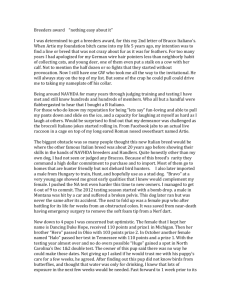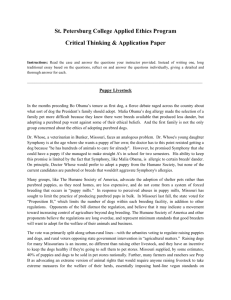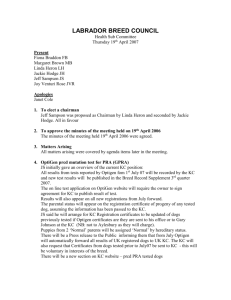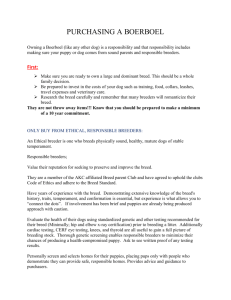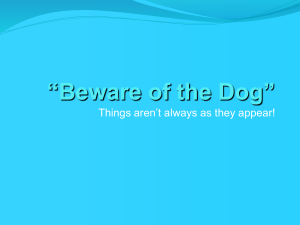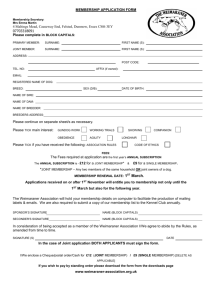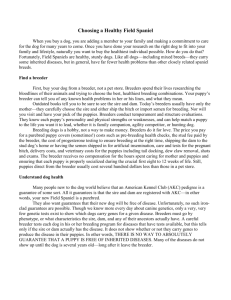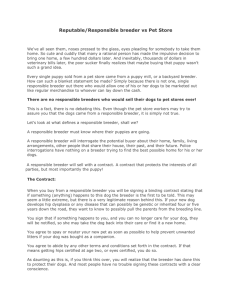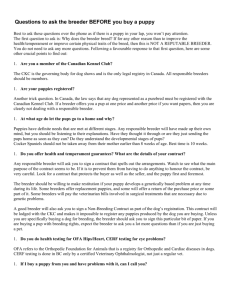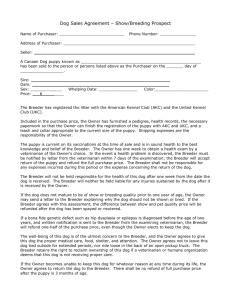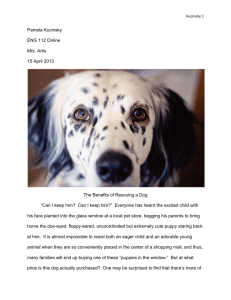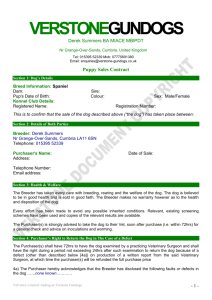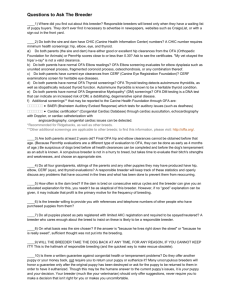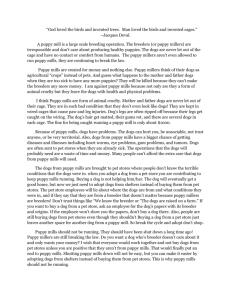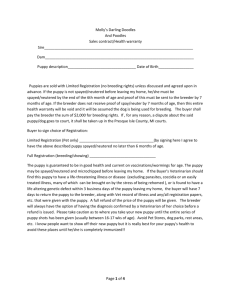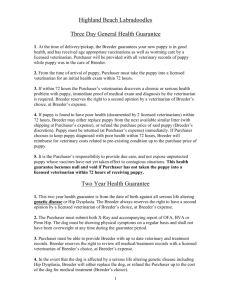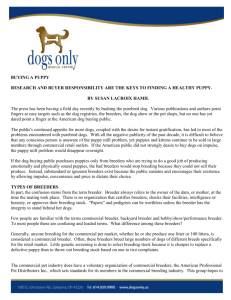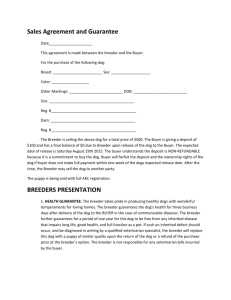Q - Ow.ly
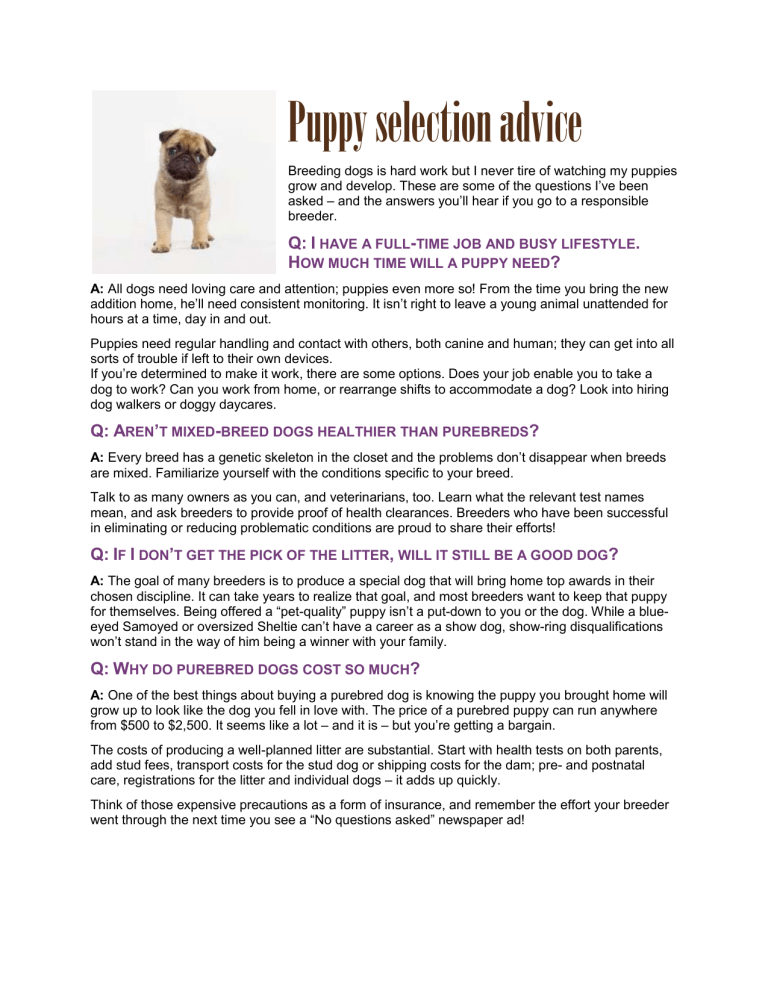
Puppy selection advice
Breeding dogs is hard work but I never tire of watching my puppies grow and develop. These are some of the questions I’ve been asked – and the answers you’ll hear if you go to a responsible breeder.
Q: I
HAVE A FULL
-
TIME JOB AND BUSY LIFESTYLE
.
H
OW MUCH TIME WILL A PUPPY NEED
?
A: All dogs need loving care and attention; puppies even more so! From the time you bring the new addition home, he’ll need consistent monitoring. It isn’t right to leave a young animal unattended for hours at a time, day in and out.
Puppies need regular handling and contact with others, both canine and human; they can get into all sorts of trouble if left to their own devices.
If you’re determined to make it work, there are some options. Does your job enable you to take a dog to work? Can you work from home, or rearrange shifts to accommodate a dog? Look into hiring dog walkers or doggy daycares.
Q: A
REN
’
T MIXED
-
BREED DOGS HEALTHIER THAN PUREBREDS
?
A: Every breed has a genetic skeleton in the closet and the problems don’t disappear when breeds are mixed. Familiarize yourself with the conditions specific to your breed.
Talk to as many owners as you can, and veterinarians, too. Learn what the relevant test names mean, and ask breeders to provide proof of health clearances. Breeders who have been successful in eliminating or reducing problematic conditions are proud to share their efforts!
Q: I
F
I
DON
’
T GET THE PICK OF THE LITTER
,
WILL IT STILL BE A GOOD DOG
?
A: The goal of many breeders is to produce a special dog that will bring home top awards in their chosen discipline. It can take years to realize that goal, and most breeders want to keep that puppy for themselves. Being offered a “pet-quality” puppy isn’t a put-down to you or the dog. While a blueeyed Samoyed or oversized Sheltie can’t have a career as a show dog, show-ring disqualifications won’t stand in the way of him being a winner with your family.
Q: W
HY DO PUREBRED DOGS COST SO MUCH
?
A: One of the best things about buying a purebred dog is knowing the puppy you brought home will grow up to look like the dog you fell in love with. The price of a purebred puppy can run anywhere from $500 to $2,500. It seems like a lot – and it is – but you’re getting a bargain.
The costs of producing a well-planned litter are substantial. Start with health tests on both parents, add stud fees, transport costs for the stud dog or shipping costs for the dam; pre- and postnatal care, registrations for the litter and individual dogs – it adds up quickly.
Think of those expensive precautions as a form of insurance, and remember the effort your breeder went through the next time you see a “No questions asked” newspaper ad!
Q: W
HY ARE PAPERS SO IMPORTANT
?
A: Registration papers are like a birth certificate; they tell you who your dog is, who his parents are, and where he comes from. However, be aware of companies that claim to register crossbreds,
“hybrids” or designer dogs, and remember that in Canada, it is against the law to charge more for a dog with papers than for one without.
Q: I
DON
’
T WANT JUST
‘
ANY
’
BREED
.
W
OULD A RARE BREED FIT MY LIFESTYLE
?
A: Many dogs are rare because their fanciers want to keep them that way. In most cases this comes from a desire to protect the breed’s heritage and not have them toned down to fit the whims of urban society. But, as anyone who owns one will tell you, there’s something uniquely special about rare breeds. If you’re bowled over by a Beagle, look into the sturdy Drever. Covet a Corgi? A Swedish
Vallhund might be for you.
Q: I
TALKED TO A BREEDER AND HE TOLD ME
I
HAVE TO GO ON A WAITING LIST
.
D
OES THIS USUALLY HAPPEN
?”
A: Chances are, the best breeders have waiting lists; how long those stretch depends on many factors. If you decide on a lesscommon variety with small litters, you’ll have to decide whether you’re willing to wait. Rather than seeing this as a setback, think of it as an opportunity to get to know your breeder and better familiarize yourself with the breed.
Check out some dog shows, visit obedience classes and be prepared to experience a whole new world!
Q: W
HY IS THE BREEDER ASKING ME SO MANY QUESTIONS
?
A: For every question you have, it’s likely we’ll have two. We’re not trying to be difficult, we’re just being sure our breed is right for your needs and lifestyle. A poor decision now makes everyone unhappy later, and it’s usually the dog that suffers most. If we don’t help you now, what can you expect two, five or 10 years down the road?
Q: W
HAT HAPPENS IF
I
CAN
’
T KEEP THE DOG
?
In a perfect world, all dogs would live long, happy lives and pass away peacefully in their owner’s home; the reality isn’t that simple. The reasons people give up dogs are many, and often heartbreaking. Should you find yourself in a no-option position regarding your dog, a solid relationship with your breeder will pay off. Don’t be ashamed or embarrassed to ask for advice or assistan ce. A great breeder doesn’t turn his or her back on you when you walk out their door. Their responsibility to the animals they bring into this world lasts a lifetime, and they’ll be your first line of defence if you need help.
